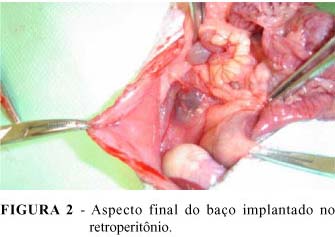PURPOSE: This study was developed to evaluated the effects of spleen transplants in the protection against abdominal sepsis in young and old Wistar rats. METHODS: Fifty-four young and old Wistar rats were utilized (90 and 180 days respectively) being distributed in three groups as follows: Sham Group, where the animal were submitted to laparotomy with manipulation of only intestine (n=12 young and adult animals), Spleenectomy Group, in which the animals were subjected to total spleenectomy (n=20 young and adult animals) and an Auto-implant Group, where the animals were subjected to total spleenectomy and a thrird of the spleen was implanted in a bag in the retroperitonium (n=22 young and adult animals). After three months the animals were subjected to a new laparotomy with binding and caecum perfuration to stimulate abdominal sepsis and were accompanied until the moment of death to establish a mortality curve. RESULTS: There was recuperation of the spleen implanted in all animals. There was no significant difference in the time of death among the groups. The young animals apparently had a better response, however it was not statistically significant. CONCLUSION: This study demonstrated that spleen implant in the retroperitonium do not prove to be an effective protection against abdominal sepsis in comparison with the spleenectomized rats.
Splenectomy; Peritonitis; Rats




